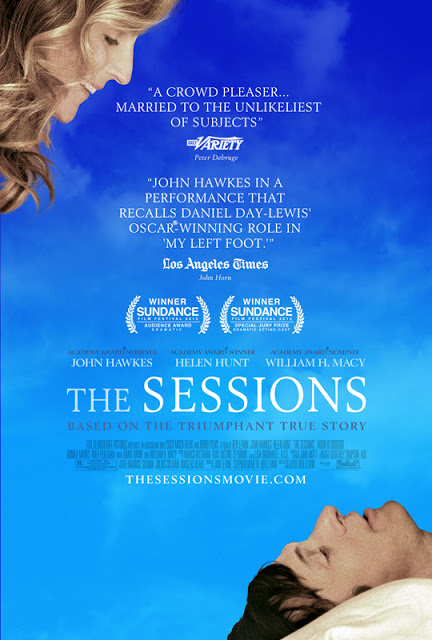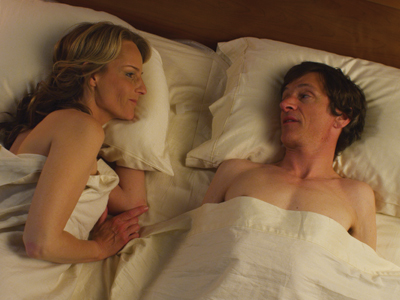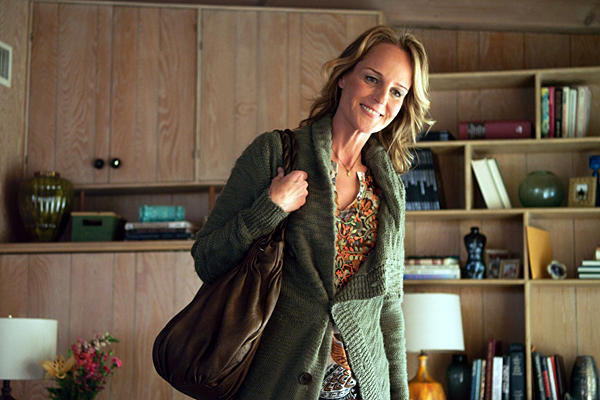 |
| poster for The Sessions |
Guest post written by Alisande Fitzsimons.
One of the more moving films of 2012 was Ben Lewin’s drama The Sessions. Based on the life and articles of profoundly disabled poet and journalist Mark O’Brien (played by John Hawkes), The Sessions depicts the period in O’Brien’s life when he engaged with Cheryl Cohen-Greene, a sex surrogate played by Helen Hunt.
Bitch Flicks Co-Founder Stephanie Rogers has already written about Sex, Disability and Helen Hunt in ‘The Sessions’ for this site, pointing out that, “Helen Hunt is awesome.” She’s right – the power of Hunt’s performance as Cheryl cannot be understated, and even though she’s already collected one Oscar (for As Good As It Gets in 1997), a lot of us are rooting for her to collect another in 2013.
 |
| Helen Hunt as Cheryl Cohen-Greene with John Hawkes as Mark O’Brien |
What Exactly Is A Sexual Surrogate?
When she first meets Mark O’Brien, Hunt’s character takes care to explain that she is a sex surrogate, rather than a sex worker but is not shown explaining the exact differences to him on-screen. For the record, the difference is this: sex workers provide sexual services in exchange for money. These services can vary wildly and some sex workers do indeed work with disabled or sexually dysfunctional clients.
A sexual surrogate on the other hand is a certified sex therapist who educates and sometimes engages in intimate acts with their patients in order to reach a therapeutic goal.
In The Sessions Hunt’s character treats O’Brien over four two hour sessions. O’Brien has never had an intimate relationship when he first begins working with Cohen-Greene but makes rapid progress, becoming comfortable with his own body, then with Cohen-Greene’s body, before finally achieving full intercourse with her and bringing her to orgasm.
Growing up in the UK, I wasn’t aware that this kind of therapy existed, and I found the film’s insight into it fascinating. The film was released there at a particularly useful moment in British culture. As I type, a former Brothel keeper called Becky Adams is getting a lot of press attention for a new charity she has founded called Para-Doxies.
The aim of Para-Doxies is to introduce disabled people of all genders and sexuality to sex workers so that their sexual needs can be met. As far as I’m aware therapy such as the sort offered by Cohen-Greene is not available in the UK. Realising how much good the sex therapy O’Brien received did him makes me hope that Adams’ project succeeds and that disabled sexuality becomes more widely accepted.
There’s Sex But It’s Not Conventionally Sexy.
I don’t mean that section heading in a bad way. In fact, the depiction of sex in The Sessions is wholly refreshing. As well as giving audiences an insight into disabled sexuality (because for some people the fact that disabled people do indeed enjoy sex apparently came as a bit of a shock), the film also does a marvelous job of presenting a leading lady who has sex both with her husband and patients in a way that’s not meant to titillate. I know I don’t have to remind anyone that this is unusual.
There are no bras or slips left on during sex in this film but even though we see Hunt naked and having sex, there’s no part of this film that makes a female viewer uncomfortable. Not because Hunt is made to look unattractive in the film – she’s simply not – but because the nudity is so much in keeping with the realist tone of The Sessions that the sex is in no way “pornified” and so does not cater to the male gaze.
Even when O’Brien, whom Hunt’s character has come to love — but, crucially, has not fallen in love with – orgasms during sex with him, it’s not the sort of noisy When Harry Met Sally moment we’ve come to expect from Hollywood films. Rather, it’s a quiet but heartfelt moment of wholly convincing intimacy between the couple.
Arguably this should make the moment on-screen even sexier because it reflects real-life lovemaking more than most sex scenes ever will. The catch though is that the scene is so beautifully written and performed that it felt hard to watch. I mean that too in a good way. I mean, who over the age of 13 can’t look at a sex scene?
The emotional investment the audience makes in the characters of Cohen-Greene and O’Brien means that watching it is not unlike one of those moments when you walk in on a friend having sex – awkward.
 |
| Helen Hunt as Cheryl Cohen-Greene |
The Private Life of a Sexual Surrogate
Apart from the sessions in which she treats O’Brien, Cohen-Greene’s professional life is depicted on-screen when Hunt is shown making notes about how the treatment is going. This part of the film is crucial, not only because it gives the audience insight into O’Brien’s state of mind from a healthcare professional but also because it is what will distinguish Cohen-Greene’s work as a sexual surrogate from that of a particularly sympathetic sex worker in the minds of less liberal viewers.
Another interesting insight the film is careful to make is into Cohen-Greene’s private life. While most of the film does indeed concentrate on O’Brien – it’s his story, and based on poetry and articles he wrote so the world could really understand disabled sexuality – the small amount of time the camera spends with Cohen-Greene at home is interesting.
What, for example, motivates someone to become a sexual surrogate over any other kind of therapist? It’s a role that hugely benefits patients but one that may cause problems for the surrogates themselves.
Cohen-Greene, for example, is married with a teenage son in the film. Her husband, whom she describes as “a philosopher” is in fact unemployed, leaving the family to rely on his wife’s income. It’s apparent that he has no problem with the nature of her work – and all credit to the filmmakers for not reducing an unemployed character to a loutish stereotype – but rather accepts her job as a valid form of employment and therapy.
In fact, until Cohen-Greene begins treating O’Brien it seems that the couple had no problems with jealousy at all. O’Brien though sparks something in his therapist that her husband recognizes as threatening. It’s not as if a man who was forced to spend at least 20 hours a day in an iron lung due to catching polio during his childhood should, in Hollywood terms at least, be much of a threat to any healthy marriage.
Yet O’Brien’s flirty and lively personality, not to mention his superior mind that can conjure up incredibly beautiful poetry, do start to come between the couple, even though it’s clear that Hunt’s character does not actually fall for her patient so much as come to respect him and care for him deeply, the way most of us do for our closest friends. She never, in spite of the non-physical intimacy the therapy could foster between them, tells him much about her personal life at all. A sure sign of love and respect for the man she is married to.
—
That Cohen-Greene is not depicted as a kind of saint who can see the lovable in a disabled man is another strength of The Sessions. The character is undoubtedly a good person but also a real one, and perhaps most importantly given the delicate nature of this kind of sex therapy, a wholly professional one.
When the patient-therapist relationship she has with O’Brien threatens her marriage, she reacts first with anger then with consideration and does what she needs to to make that relationship work.
At the film’s end she is shown attending O’Brien’s funeral with her husband, to whom she is still married. When O’Brien’s girlfriend, whom he met after his sessions with Cohen-Greene have finished, reads out a love poem that is clearly about Cohen-Greene, Hunt just smiles.
When the love you have for someone is that great, be it platonic or romantic, sometimes the fact that both of you know is enough. It’s a credit to Hunt that her characterization of a character who could easily have been made out to be brassy or manipulative never is, and I really hope she’s duly rewarded by the Academy for it.
———-
Alisande Fitzsimons is a sex positive writer. She can be found tweeting @AlisandeF.

I think this type of movies is a great way to promote to surrogacy. Keep up the good work. All the best.